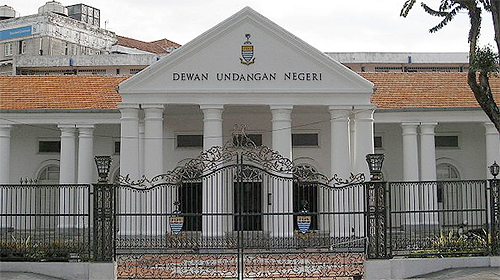IF all goes smoothly, Penang will hold local government elections by year end, something not done in Malaysia for almost 50 years since 1965. This is due to the Local Government Elections (Penang Island and Province Wellesley) Enactment 2012 that was passed on 9 May 2012. The Election Commission (EC) has indicated it will not conduct such elections but a Penang government representative has said the state will attempt to compel the EC to do so through a court declaration.
What challenges are in store for the return of local government elections? What does this mean for Penang citizens and for Malaysians? The Nut Graph asks political scientist Wong Chin Huat.

TNG: What is the likelihood that the Penang local government law will be implemented? What are the challenges in its implementation?
The chances of the law being implemented are zero before the 13th general election. The enactment assigns the EC with full responsibility to conduct elections, maintain the electoral rolls, and district the local government areas into wards. But the EC has already made it clear that it will not cooperate and the state can go ahead without it.
This is the main challenge. The state government may eventually need to force the EC to execute its orders through judicial means. But the prospect of success is shadowed by a judiciary whose independence has been questioned. I can’t see other challenges such as, low turnout or inadequate competition, being a hindrance since the people are eagerly awaiting local elections.
Sceptics say the judiciary will only compel the EC to act once there is a change in Putrajaya. So, practically, Penang’s plan will only materialise after a general election that brings about regime change. This may be a smart way for DAP to place the ball in Barisan Nasional (BN)’s court and to answer accusations that it reneged on its election promise to reintroduce local elections.
To answer the sceptics, the Penang government can hold mock elections for local council nominees while waiting to see this enactment implemented. Some claim this is illegal. But is it illegal if an employer decides to ask around before a job interview? The state government has surely already been consulting stakeholders like their party grassroots, business chambers and friendly non-governmental organisations in appointing the current batch of councillors. It cannot be illegal just because they do it in a more formal and inclusive way.

What benefit will citizens derive from having local council elections?
The most obvious benefit is that the people will hire and fire the local government, not just sign its pay check. Local governments — with the exception of Penang and Selangor — often act as the citizens’ boss, because they can’t be sacked.
A more long-term and far-reaching benefit is this: local elections will cement the two-party system, decentralise power from Putrajaya, and erode the psychological base for ethnic-based politics.
At the moment, the one-party state established since 1969 operates on one principle: the winner takes it all, like in the ABBA song. Power is concentrated in Putrajaya and the political risk of changing the federal government is therefore unreasonably high. This makes Malaysians conservative and deprives the opposition of healthy room for growth.
If the federal opposition, whether Pakatan Rakyat (PR) or BN, fail to win important states in the next general election, we may see the current two-party competition fade away. At present, running resource-rich state governments is the only way for an opposition coalition to survive healthily. However, with local elections, even if one coalition wins landslide victories at federal and state levels, the opposition will likely still control a substantial number of local councils to enable them to stay on and fight.
You may ask, why doesn’t BN want a guarantee of its own survival? The answer is that BN — and PR is no better — is a gambler. Gamblers always believe they will win the next bet. Gamblers don’t buy insurance.
What about decentralisation of power and eroding the psychological base of ethnic-based politics?

Once elected, local governments will gain autonomy vis-a-vis state governments. At the moment, if local governments are inefficient and unresponsive, it keeps state governments busy and important. Imagine if all the rubbish and pot hole problems were solved, who would state assemblypersons blame for their shortcomings?
A local councillor spends about two months a year attending full board and committee meetings. In contrast, a state assemblyperson generally spends less than a month in assembly sessions. Why? Because state governments have too little power. If assemblypersons spent three months a year in the legislature as parliamentarians do, what would they discuss? That’s why state governments are lukewarm towards local elections. They are worried about their own marginalisation.
With local elections, the only way state governments will stay relevant is by forcing decentralisation so that they control education, police, healthcare, transport or some other policy fields. Hence, local elections will eventually threaten the highly centralised state, force an end to the concentration of power, or expose the marginalisation of states.
From a communal perspective, decentralisation increases the chance of an ethnic group gaining control in at least one level of government. This prevents suppression or marginalisation by another level of government perceived to be controlled by another group.
For example, without local elections, a communally-conscious Muslim in Seberang Prai may feel threatened by the Penang government and its subsidiary Majils Perbandaran Seberang Prai that are perceived to be dominated by non-Muslim ethnic Chinese. He or she may worry that if PR wins federally, this would further marginalise the Muslim community. With local elections and decentralisation, and more powerful states, such individuals may be less worried about a federal regime change because their co-ethnic/co-religious could control the local council with substantial power vis-a-vis the state government. They could also migrate to Malay-Muslim-majority Kedah which would have substantial power vis-a-vis Putrajaya.
So dismantling the “winner-takes-all” characteristic of our governmental system would make us less vulnerable to communal fear-mongering.
BN state chief Teng Chang Yeow reportedly said that having local government elections will add to the fiery political situation and may result in a situation where the state government cannot work with city councils. How would it work if PR controls the state government and BN controls the city councils?

Teng basically lives in a pre-modern age. Modern societies accept conflicts and competitions — including that between governments — as norms. You no longer expect the lower governments to obey the upper governments religiously. Following Teng’s logic, we should abolish state elections, too. Haven’t we seen enough inter-governmental conflicts between Putrajaya and the four PR states?
If BN controls the federal government and local councils while PR controls the state government, the PR state government naturally stands to lose in the short term. This is because they will be checked by both their upper and lower level governments. They will have to ensure their policies are really popular to overcome the federal and local challenges.
The BN, on the other hand, would benefit greatly from local elections. In particular, Teng’s party, Gerakan, would be the greatest beneficiary as it is unlikely to win any Penang seat with Umno and Perkasa Penang staging attacks on popular Chief Minister Lim Guan Eng. I believe the majority of Penang voters would not risk voting for Gerakan to avoid accidentally voting in an Umno- and Perkasa-controlled state government. However, they may not mind voting in Gerakan into municipal councils to check on PR.
Should the DAP-led Penang government be commended for taking the lead on passing this enactment? What about the other PR state governments, especially in PAS-led Kelantan? What’s taking them so long?

Certainly we should praise the DAP-led Penang government. More praise will be due if they kickstart mock elections while waiting for the EC to comply. We must also step up the pressure on its PR allies especially PAS which has ruled Kelantan for 22 years and not done a single thing towards local democracy. While PAS’s commitment to parliamentary struggle is unquestionable, it’s time we question if the party is really committed to democracy and federalism. After all, elections can produce “elective dictatorship”. This is exactly how critics describe the executive dominance in the UK, notwithstanding the presence of local elections there. ![]()
Wong Chin Huat is a Bersih 2.0 steering committee member. He is also a political scientist by training and a journalism lecturer by trade. If readers have questions and issues they would like Wong to respond to, they are welcome to e-mail editor@thenutgraph.com for our consideration.
[related-posts]
Read previous Uncommon Sense columns


stewoolf says
I would think that local elections are within the purview ofthe state sovereign?? Can Chin Huat or others clarify that. The Penang state government can setup “mock” local election rules and constituencies, then “appoint” whoever voted in by residents, as long as it can afford to fund the elections and respects the election results. Any disputes can be settled by an independent panel.
chinhuatw says
The state’s control of local government is compromised by the Local Government Act 1976 and also the National Council on Local Governments. But mock election by-pass both these and is perfectly within the state purview.
Gopal Raj Kumar says
An efficient and savvy state government can and would be able to overcome any differences with local government in any parliamentary democracy.
It is a question of what compromises one is prepared to make with the other. The state will always prevail where there is a conflict providing the conflicts are based on the law and not an attempt to breach it.
At the end of this year when Penang holds its state elections, the ruling party will be soundly defeated, its electoral base eroded and divided before the ballot.
This is politics and not for the faint-hearted. The DAP has fired the last shot in its chamber and has aligned itself with disruptive unproductive elements at the federal opposition level.
Pragmatism and pro-active Malay constituents and some Chinese opportunists will no doubt feel the change in the wind and switch sides. Its a part of the chameleon in politics in Malaysia especially in places like Penang.
Selangor is rotten to the core, performing poorly, dirty and communal like the adversary it blames and replaced. It will serve as no role model for Penang.
Guan Eng has too many rattly skeletons in his closet which will be forced out prior to the next state elections.
hahaha says
Hello Gopal are you living in neverland? Or are you just trying to get some attention? Wake up, look around you and you will see the reality of what’s happening.
zik says
Hope the Penang government can amend the wording of the bills. After Independence we don’t call Province Wellesley anymore…now we call the mainland Seberang Perai. Same as [US] after winning independence from the British don’t call themselves the 13th Colony of King George anymore, they call themselves the Union Of American States!!